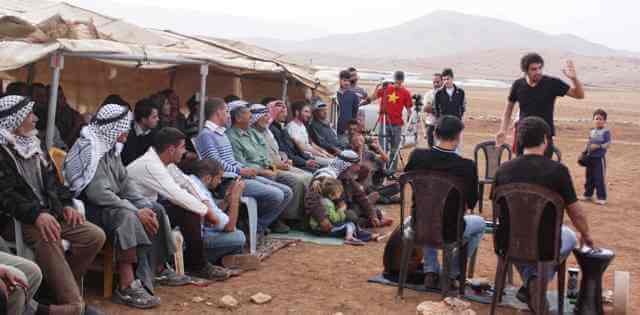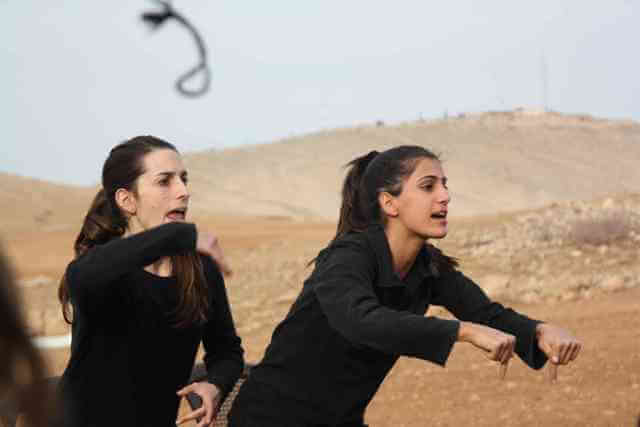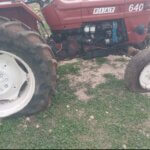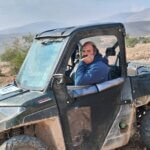Freedom Theatre in Al Hadidiya
 On 16th November 2012, Al Hadidiya was the third of four stops for the ‘Ride for Water Justice’ and an opportunity for members of the community to share stories and insights of their lives under the occupation.
On 16th November 2012, Al Hadidiya was the third of four stops for the ‘Ride for Water Justice’ and an opportunity for members of the community to share stories and insights of their lives under the occupation.
A joint initiative between the Freedom Theatre, Thirsting for Water Justice and Juzoor, the Ride for Water Justice brings together Palestinian and international activists, students, journalists, artists and the wider public to discuss water apartheid and the broader struggle for freedom and justice in occupied Palestine through Playback Theatre performances, community discussions and guided tours.
As part of the day’s event, the group visited the now-dry spring at Ras al Auja and along the way to Al Hadidiya, witnessed the stark contrast between extensive and exploitative settlement agriculture and the restrictions curtailing the existence of Palestinian communities in Area C. After a warm welcome by members of the communities of Al Hadidiya, Mak-hul and Khirbet Humsa, Abu Sakkr, head of the community in Al Hadidiya, gave a short presentation and lead a walk in the area to highlight what is encapsulated by the sheer location of Al Hadidiya – very close to the lush and green colony of Ro’i, the families in Al Hadidiya have no access to the water pumped from right under their feet.
While settlers receive free irrigation water and have an endless supply of highly discounted drinking water, every drop of water reaching the fourteen families in Al Hadidiya is controlled. The only way for the community to get water is by travelling to nearby towns to purchase water from the Israeli state-owned water company, Mekorot, at the exorbitant rate of 25NIS per cubic litre, always risking confiscation of their tanks along the way.
 Back from the walk and near the home of Abu Sakkr, the Israeli Occupation Forces (IOF) arrived to ask about a permission for the event, claiming that it was taking place on land belonging to the nearby colony. Irrespective, lunch was served – and permission to proceed or not, the performance began.
Back from the walk and near the home of Abu Sakkr, the Israeli Occupation Forces (IOF) arrived to ask about a permission for the event, claiming that it was taking place on land belonging to the nearby colony. Irrespective, lunch was served – and permission to proceed or not, the performance began.
Using Playback Theatre, actors from the Freedom Theatre improvised and instantaneously transformed three powerful stories shared by different members of the community into short visualisation and pieces of theatre. Resonating the preceding encounter with the IOF – and depicting what happens when members of the community are not supported by the presence of a large group – all three stories focused on violent attacks by the IOF. Firstly, twenty-four year old nursing graduate Zati, son of Abu Sakkr, told of an incident when he was arrested by the IOF while herding his family’s sheep, beaten by the soldiers, attacked by dogs and after hours released in the darkness of night. Then, Salah Youssef Mahmoud, resident of Al Hadidiya, spoke of a day when he found himself overwhelmed by full-scale military training in the area where he was grazing his animals, and how he returned to rescue one of his animals despite the shooting exercises. Finally, Um Moad, one of Abu Sakkr’s wives, shared how she witnessed her son being arrested and harassed by the IOF.
Key to the day’s packed schedule of encounters, information and conversations was the realisation that telling, visualising, interpreting and witnessing the stories told by members of the community means vocalising and recognising the truth for it never to be denied – and to take action and support the Palestinian communities in the Jordan Valley on this basis.





